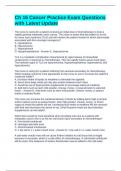-
1. Exam (elaborations) - Chapter 20 essential cell biology (little focus on cancer sections) exam questions wi...
-
2. Exam (elaborations) - Radiation therapy for lung cancer exam questions with latest update
-
3. Exam (elaborations) - Radiation therapy for breast cancer exam questions with correct answers
-
4. Exam (elaborations) - Advanced pathophysiology exam 1 cancer questions and answers
-
5. Exam (elaborations) - Ah3 pearson nclex cancer (exam #1) questions and answers latest update
-
6. Exam (elaborations) - Bio of cancer exam 2 questions with correct answers
-
7. Exam (elaborations) - Cancer exam 4 (final exam) questions and answers latest update
-
8. Exam (elaborations) - Cancer exam 2 questions and answers
-
9. Exam (elaborations) - Cancer exam 2 questions and answers latest update
-
10. Exam (elaborations) - Cancer biology final exam questions with latest update
-
11. Exam (elaborations) - Cancer basics exam questions and answers
-
12. Exam (elaborations) - Cancer ati exam questions and answers
-
13. Exam (elaborations) - Bios 1030- exam 1- cancer questions and answers
-
14. Exam (elaborations) - Biology of cancer exam 1 questions with latest update
-
15. Exam (elaborations) - Biology of cancer exam #1 questions with verified answers
-
16. Exam (elaborations) - Biology 316 (study of cancer) exam 1 questions and answers
-
17. Exam (elaborations) - Cancer exam questions and answers
-
18. Exam (elaborations) - Cancer exam questions with verified answers
-
19. Exam (elaborations) - Cancer exercise specialist exam questions with latest update
-
20. Exam (elaborations) - Cancer final exam questions with complete solutions
-
21. Exam (elaborations) - Cancer final exam questions with correct answers
-
22. Exam (elaborations) - Cancer med-surg exam 3 questions and answers
-
23. Exam (elaborations) - Cancer registry exam 2 questions with latest update
-
24. Exam (elaborations) - Cancer review exam questions and answers
-
25. Exam (elaborations) - Cancer test bank exam questions with correct answers
-
26. Exam (elaborations) - Cancer test bank exam questions with latest update
-
27. Exam (elaborations) - Cancer test yourself exam questions with correct answers
-
28. Exam (elaborations) - Cancer-adult & child exam questions with complete solutions
-
29. Exam (elaborations) - Care of client with cancer exam questions with correct answers
-
30. Exam (elaborations) - Cell cycle and cancer test review exam questions and answers
-
31. Exam (elaborations) - Ch 16 cancer practice exam questions with latest update
-
32. Exam (elaborations) - U6a1 proctored cancer test bsc1005 exam questions and answers
-
33. Exam (elaborations) - Respiratory lung cancer, chest tubes, suctioning, n172 exam questions and answers
-
34. Exam (elaborations) - Pn cancer test exam questions and answers
-
35. Exam (elaborations) - Pathophysiology (exam 1) cancer questions with correct answers
-
36. Exam (elaborations) - Nu 300 exam 1 cancer, culture, pain, med-surg nursing questions with correct answers
-
37. Exam (elaborations) - Nsg med surg 1 cancer exam 1 questions with complete solutions
-
38. Exam (elaborations) - Med surg test 1 cancer exam questions and answers
-
39. Exam (elaborations) - Med surg exam 4 – cancer questions with latest update
-
40. Exam (elaborations) - Med surg 2 exam 1- cancer questions and answers
-
41. Exam (elaborations) - Lung, breast, colon cancer exam 3 questions with correct answers
-
42. Exam (elaborations) - Life science cancer exam irsc questions with complete solutions
-
43. Exam (elaborations) - Lewis cancer exam questions with latest update
-
44. Exam (elaborations) - Intro to cancer exam 2 study guide questions and answers
-
45. Exam (elaborations) - Intro to cancer - exam one questions with complete solutions
-
46. Exam (elaborations) - Hiv/cancer exam questions with correct answers
-
47. Exam (elaborations) - Health psychology exam 4 cancer questions and answers
-
48. Exam (elaborations) - Final exam- cancer prevention questions with latest update
-
49. Exam (elaborations) - Exam 4 psychosocial needs with cancer questions and answers
-
50. Exam (elaborations) - Exam 3 – cancer exam questions with correct answers
-
51. Exam (elaborations) - Exam 1 breast and prostate cancer learning objectives questions and answers
-
52. Exam (elaborations) - Exam #3 cancer quiz questions with complete solutions
-
Show more




